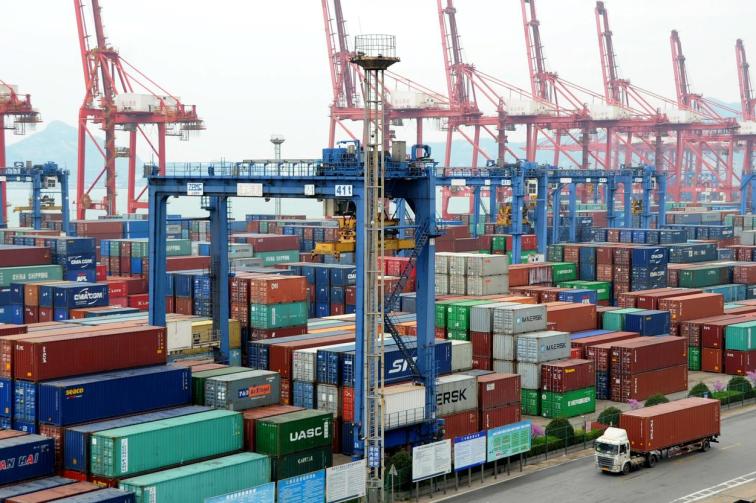U.S. President Trump posted on Truth Social on October 12. (Screenshot from the internet)
[People News] After Beijing announced export controls on rare-earth products on October 9, U.S.–China relations suddenly became tense. On October 10, U.S. President Donald Trump immediately struck back, announcing a 100% tariff increase on Chinese goods. Then, at noon on October 12 (U.S. Eastern Time), Trump posted again, saying that Xi Jinping is in a very bad mood, adding that “the United States wants to help China, not hurt it.” Why did Trump suddenly mention Xi’s bad mood? Some analysts believe this shows that U.S. intelligence has learned that Xi’s power may be facing a serious internal crisis. On October 7, Gordon Chang, a legal scholar with a doctorate from Cornell University, analyzed on Fox News that Xi might lose his position as General Secretary or Chairman of the Central Military Commission at the upcoming Fourth Plenary Session.
On October 12, Trump posted on Truth Social: “Don’t worry about China — everything will be fine.” He added that Xi was just in a bad mood (had a bad moment). Trump said he doesn’t believe Xi wants to see China fall into an economic recession — nor does he himself. “The United States wants to help China, not hurt it.”
U.S. Vice President J.D. Vance, in an interview on the same day, also revealed that President Trump is willing to engage in rational negotiations with China on tariff issues, urging Beijing to “choose the path of reason.” He emphasized that Trump holds more leverage in the talks, and that the U.S. will “watch closely in the coming weeks,” hoping Beijing will respond rationally.
Analysts believe that Washington has been closely monitoring Beijing’s political situation. In recent months, multiple senior U.S. officials and major media outlets have reported that a power shift within Xi’s leadership could be imminent. U.S. intelligence agencies constantly track developments in Zhongnanhai, as Washington needs to confirm that its negotiating counterpart in trade talks is the person actually in power. Trump’s sudden remark that “Xi Jinping is in a bad mood” seems to carry implied meaning — a message between the lines. What could make Xi so upset? Naturally, it would be the threat to his authority, or even a crisis of losing power.
On October 7, Fox News invited Gordon Chang, a Cornell-trained legal scholar, to discuss the issue on its program “Mornings with Maria.” Chang noted that Xi had not made any high-profile public appearances since September 2025, and combined with U.S. intelligence reports, this suggested that the CCP’s Fourth Plenary Session could be a turning point, during which Xi might lose his General Secretary or Central Military Commission Chairman position.
Chang said his judgment that Xi’s power is in serious trouble came partly from U.S. Ambassador to China David Perdue, who said Trump and Xi might not meet until next year. Chang inferred that Xi may have been placed under house arrest and thus unable to leave the country — or that Xi fears losing control if he travels abroad.
According to a CNBC report, Ambassador Perdue stated on September 23 that the much-anticipated U.S.–China leaders’ summit is more likely to occur next year, rather than in the fall of this year.
Chang warned that if Xi loses control during the Fourth Plenary Session, it could trigger geopolitical instability.
Writer and international political-economic commentator Wang Hao posted on Facebook on October 11 that, as the Fourth Plenary Session approaches, Beijing has taken a series of coordinated actions — adding rare earths, lithium batteries, synthetic graphite, and superhard material equipment to its export control list, while simultaneously investigating NVIDIA, Qualcomm, and other American firms. He argued that this is primarily an “external expression of internal anxiety,” allowing Xi to rebuild public and intra-party loyalty through a narrative of being “encircled” and “suppressed,” thereby re-aligning the regime amid crisis. Secondly, Wang said, it serves as a preemptive hedge against a possible Trump–Xi summit, using rare earths and the new energy supply chain as leverage to pressure Washington into concessions.
Michael Flynn — Trump’s first National Security Advisor during his first presidential term — posted on X (formerly Twitter) in June: “Attention! There is clearly a power transition happening within the Chinese Communist Party. China watchers need to closely monitor the CCP’s core members, especially officials in the government and national security apparatus who are losing confidence.” Flynn warned that changes in the CCP leadership could have enormous consequences.
Flynn is a retired U.S. Army Lieutenant General, former Director of the Defense Intelligence Agency (DIA), and National Security Advisor — once the top intelligence officer in the U.S. military. △











News magazine bootstrap themes!
I like this themes, fast loading and look profesional
Thank you Carlos!
You're welcome!
Please support me with give positive rating!
Yes Sure!